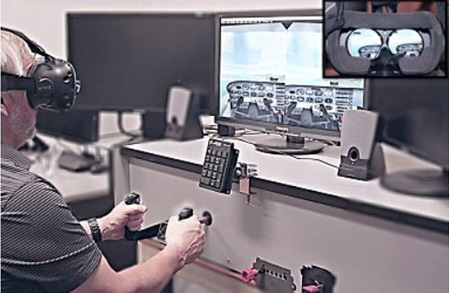by Kathleen Van Benthem, Ph.D. and Anya Pejemsky, Research Assistant, ACE Lab, Institute of Cognitive Science, Carleton University.
The Advanced Cognitive Engineering (ACE) Lab at Carleton University, located in Ottawa, specializes in research regarding transport safety. Specifically, the ACE Lab uses virtual and full-scale flight simulation to investigate foundational principles of cognition and human-machine integration. You will find articles about our work in the Aviation Safety Letter on the topics of prospective memory (Issue 1/2018), situation awareness (Issue 3/2018), diversion management (Issue 4/2018), and electronic flight bags (Issue 1/2019). Given the current physical-distancing restrictions the ACE Lab is seeking volunteers to participate in two upcoming “virtual” studies that will be of interest to the aviation community.
The first study represents the next phase of our validation of CANFLY, a cognitive health screening tool for pilots. The main goal of the CANFLY research agenda is to promote flying for as long as safely possible. The CANFLY has shown excellent promise as a tool for identifying cognitive factors associated with risk during flight. For the CANFLY study, participants will answer short questions about situation awareness after watching four short interactive video clips of flight scenarios. Validation on a large scale with pilots across Canada is an important aspect of this phase of the CANFLY research.
The second study, “Visual Illusions in Virtual Reality Flight Simulation”, explores the presence and impact of flight-related visual illusions in 3D virtual reality (VR) environments. This study is innovative, as it is seeking licensed pilots who have access to 3D VR systems like the HTC Vive or Oculus Rift. During the study, participants will complete several guided flight scenarios. Your interaction with the researcher will take place via a virtual meeting! The results of this study will provide us with insight into the validity of training and testing pilots for flight illusions using VR systems (which are economical and offer high ecological validity).
For both studies, pilots of all ages and levels of experience are encouraged to participate. Rather than having pilots attend our physical laboratory, we are modifying our research methods so that data can be collected from pilots in the comfort of their own homes. As always, the data will be completely anonymized: we do not ask for person identifiers, and IP addresses are not trackable through our platform.
For further inquiries or to indicate interest in participating in one or both of the upcoming studies you can send a message to CessnaStudy@gmail.com or check out the study links on the Carleton University website.
We thank you for your interest and hope to hear from you soon!
